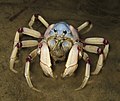Superregnum: Eukaryota
Cladus: Unikonta
Cladus: Opisthokonta
Cladus: Holozoa
Regnum: Animalia
Subregnum: Eumetazoa
Cladus: Bilateria
Cladus: Nephrozoa
Cladus: Protostomia
Cladus: Ecdysozoa
Cladus: Panarthropoda
Phylum: Arthropoda
Cladus: Pancrustacea
Superclassis: Multicrustacea
Classis: Malacostraca
Subclassis: Eumalacostraca
Superordo: Eucarida
Ordo: Decapoda
Subordo: Pleocyemata
Infraordo: Brachyura
Sectio: Eubrachyura
Subsectio: Thoracotremata
Superfamilia: Ocypodoidea
Familia: Mictyridae
Genus: Mictyris
Name
Mictyridae
References
Davie, P.J.F.; Wisespongpand, P.; Shih, H.-t. 2013: A new species of Mictyris Latreille, 1806 (Crustacea: Decapoda: Brachyura: Mictyridae) from the Andaman coast of Thailand, with notes on its ecology and behaviour. Zootaxa 3686(1): 65–76. DOI: 10.11646/zootaxa.3686.1.3 Reference page.
Vernacular names
English: Soldier crab
ไทย: ปูทหาร
Mictyris is a genus of brightly coloured crabs, placed in its own taxonomical family, the Mictyridae.[1] It inhabits the central Indo-West Pacific region. These crabs congregate on mud flats or beaches in groups of a few thousand, and filter sand or mud for microscopic organisms. They congregate during low tide, and bury themselves in the sand during high tide or whenever they are threatened. This is done in wet sand, and they dig in a corkscrew pattern, leaving many small round pellets of sand behind them.
Species
The genus contains eight species:[1][2][3] [4]
| Image | Scientific name | Distribution |
|---|---|---|
 |
Mictyris brevidactylus Stimpson, 1858 | Japan, China (including the type location, Hong Kong), Taiwan, Singapore, and parts of Indonesia (Karakelong, Bawean and Ambon Island) |
| Mictyris darwinensis Unno & Semeniuk, 2011 | Australia(Kimberley to Cape York) | |
| Mictyris guinotae Davie et al., 2010 | Ryukyu Islands of Japan | |
| Mictyris livingstonei McNeill, 1926 | Australia | |
 |
Mictyris longicarpus Latreille, 1806 | Bay of Bengal to New Caledonia and Australia |
| Mictyris occidentalis Unno, 2008 | Australia(King Bay, Dampier Archipelago) | |
 |
Mictyris platycheles H. Milne-Edwards, 1852 | Tasmania and Australia(Victoria to Queensland) |
| Mictyris thailandensis Davie, Wisespongpand & Shih, 2013 | Thailand |
The predictable behaviour of these crabs has led them to be used in experiments in a form of billiard ball computer.[5][6]
References
Peter K. L. Ng; Danièle Guinot & Peter J. F. Davie (2008). "Systema Brachyurorum: Part I. An annotated checklist of extant Brachyuran crabs of the world" (PDF). Raffles Bulletin of Zoology. 17: 1–286. Archived from the original (PDF) on 2011-06-06.
Peter Davie (2010). "Mictyris Latreille, 1806". WoRMS. World Register of Marine Species. Retrieved April 15, 2012.
Peter J. F. Davie; Hsi-Te Shih & Benny K. K. Chan (2010). "A new species of Mictyris (Decapoda, Brachyura, Mictyridae) from the Ryukyu Islands, Japan". Studies on Brachyura: a Homage to Danièle Guinot (PDF). pp. 83–105. doi:10.1163/ej.9789004170865.i-366.61. ISBN 9789047424178. Archived (PDF) from the original on 2019-12-06.
Unno, J. & Semeniuk, V. (2011). "A new species of Mictyris (Crustacea: Decapoda: Brachyura: Mictyridae) recorded from northern Australia Kimberley region to Cape York" (PDF). Journal of the Royal Society of Western Australia. 94: 45–54.
Jacob Aron (April 12, 2012). "Computers powered by swarms of crabs". New Scientist. Archived from the original on 2012-09-05. Retrieved April 15, 2012.
Yukio-Pegio Gunji; Yuta Nishiyama & Andrew Adamatzky (2011). "Robust soldier crab ball gate". Complex Systems. 20: 2. arXiv:1204.1749. Bibcode:2012arXiv1204.1749G.
Retrieved from "http://en.wikipedia.org/"
All text is available under the terms of the GNU Free Documentation License

